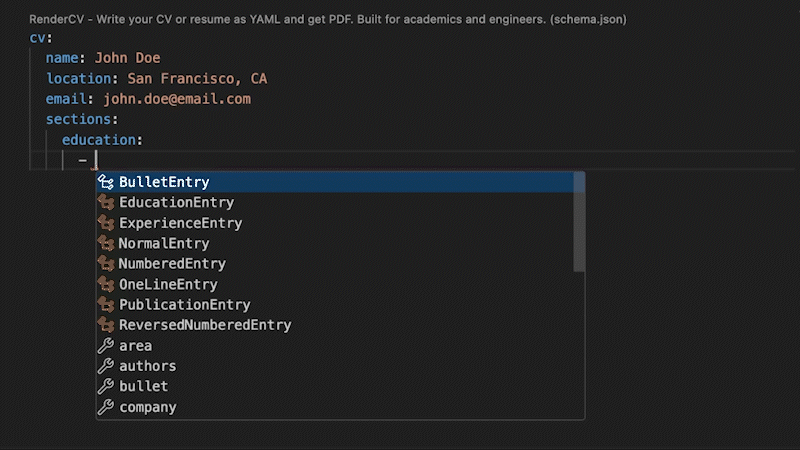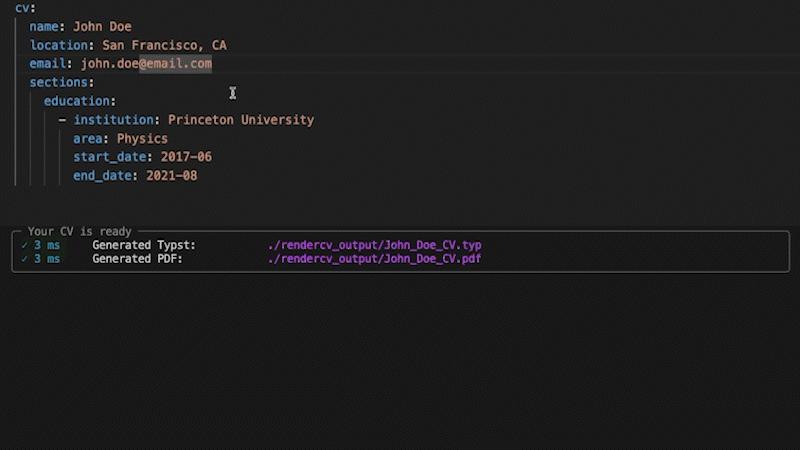Typst-based CV/resume generator
Project description
Write your CV or resume as YAML, then run RenderCV,
rendercv render John_Doe_CV.yaml
and get a PDF with perfect typography. No template wrestling. No broken layouts. Consistent spacing, every time.
With RenderCV, you can:
- Version-control your CV — it's just text.
- Focus on content — don't wory about the formatting.
- Get perfect typography — pixel-perfect alignment and spacing, handled for you.
A YAML file like this:
cv:
name: John Doe
location: San Francisco, CA
email: john.doe@email.com
website: https://rendercv.com/
social_networks:
- network: LinkedIn
username: rendercv
- network: GitHub
username: rendercv
sections:
Welcome to RenderCV:
- RenderCV reads a CV written in a YAML file, and generates a PDF with professional typography.
- See the [documentation](https://docs.rendercv.com) for more details.
education:
- institution: Princeton University
area: Computer Science
degree: PhD
date:
start_date: 2018-09
end_date: 2023-05
location: Princeton, NJ
summary:
highlights:
- "Thesis: Efficient Neural Architecture Search for Resource-Constrained Deployment"
- "Advisor: Prof. Sanjeev Arora"
- NSF Graduate Research Fellowship, Siebel Scholar (Class of 2022)
...
becomes one of these PDFs. Click on the images to preview.
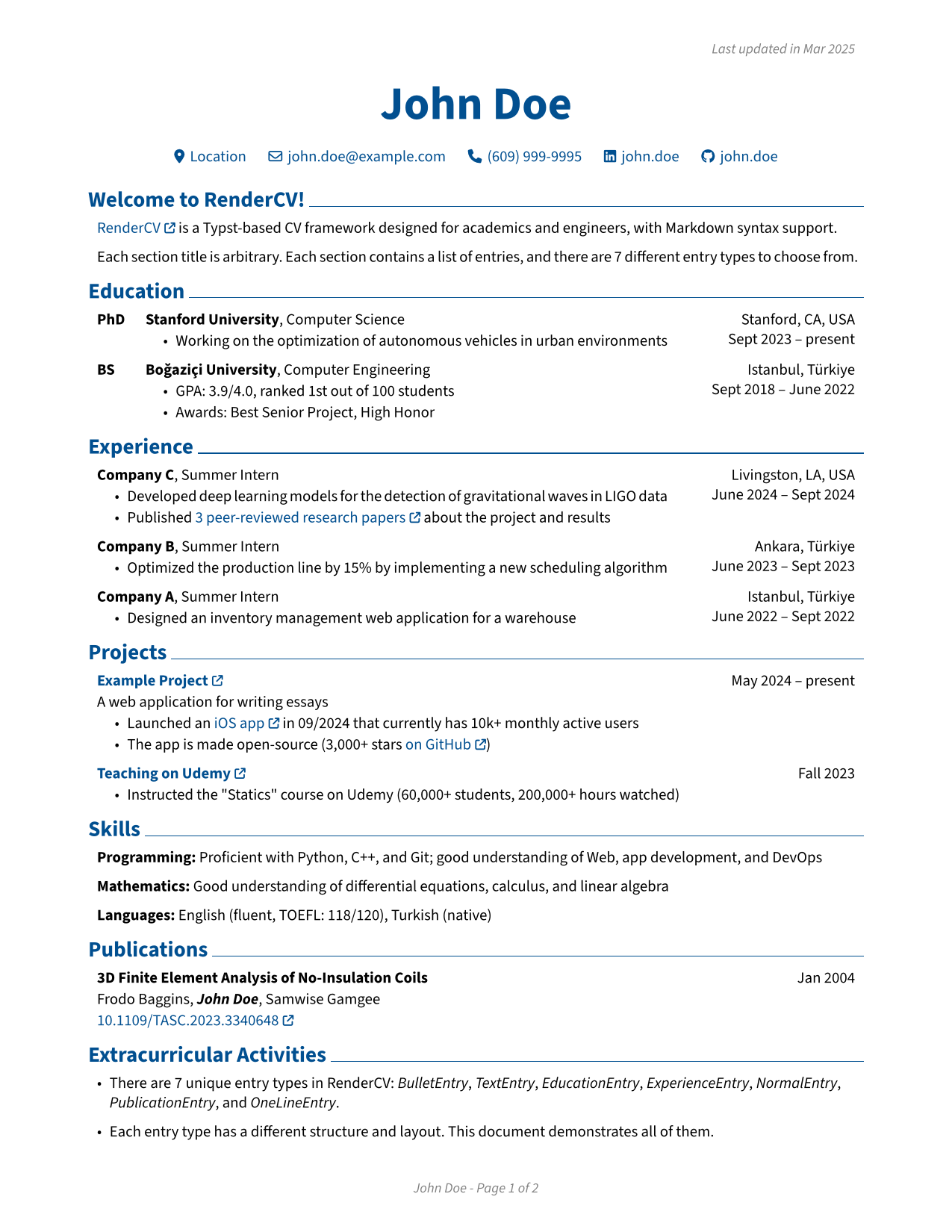 |
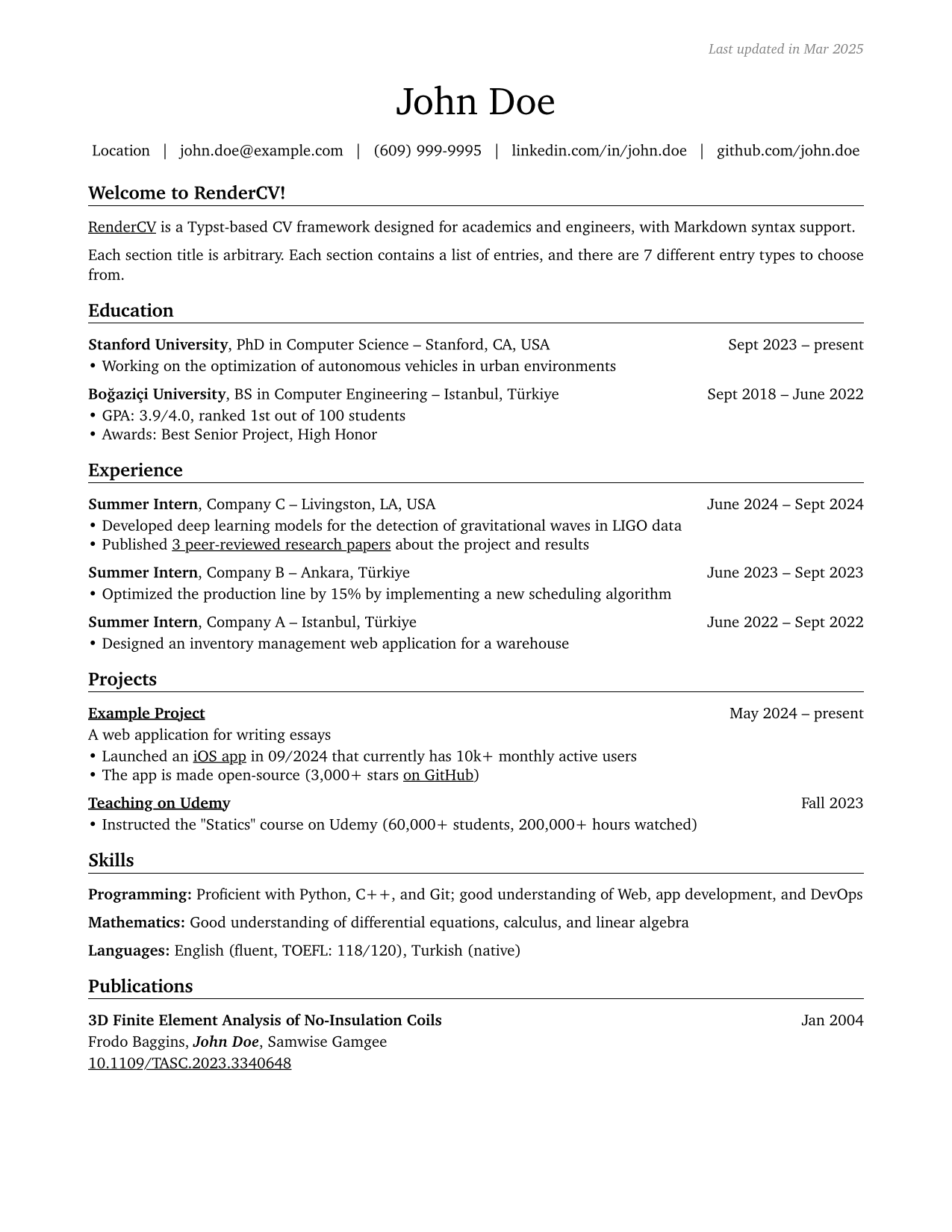 |
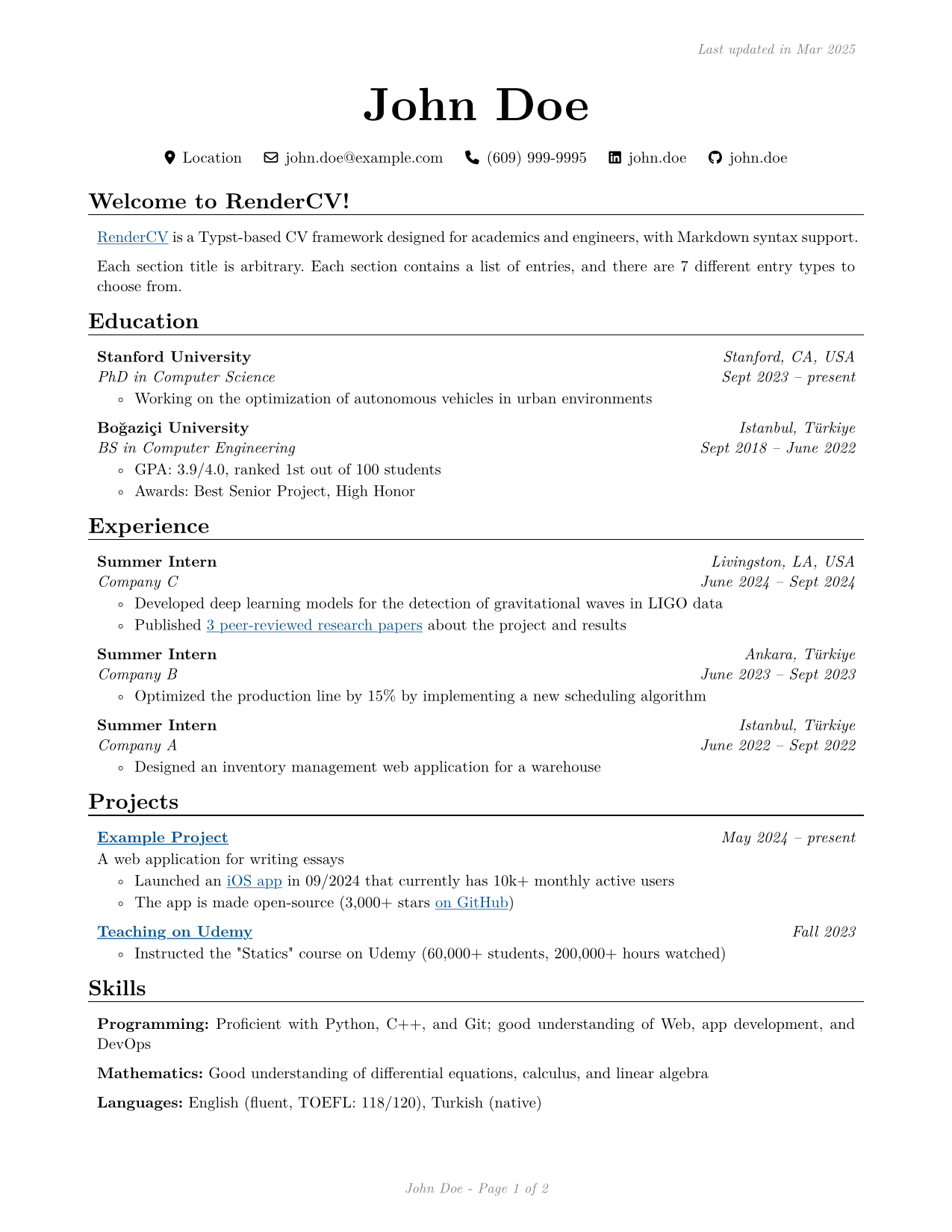 |
|---|---|---|
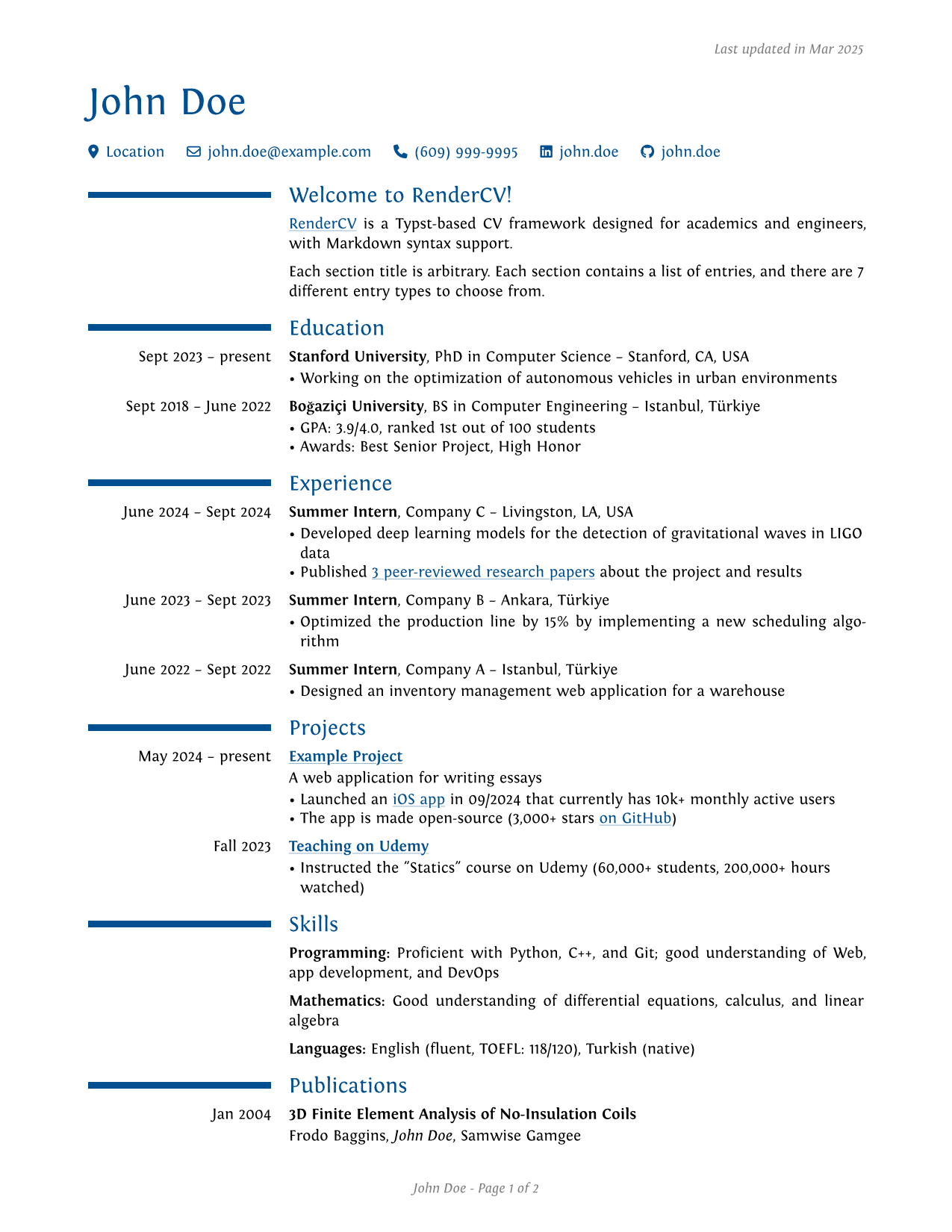 |
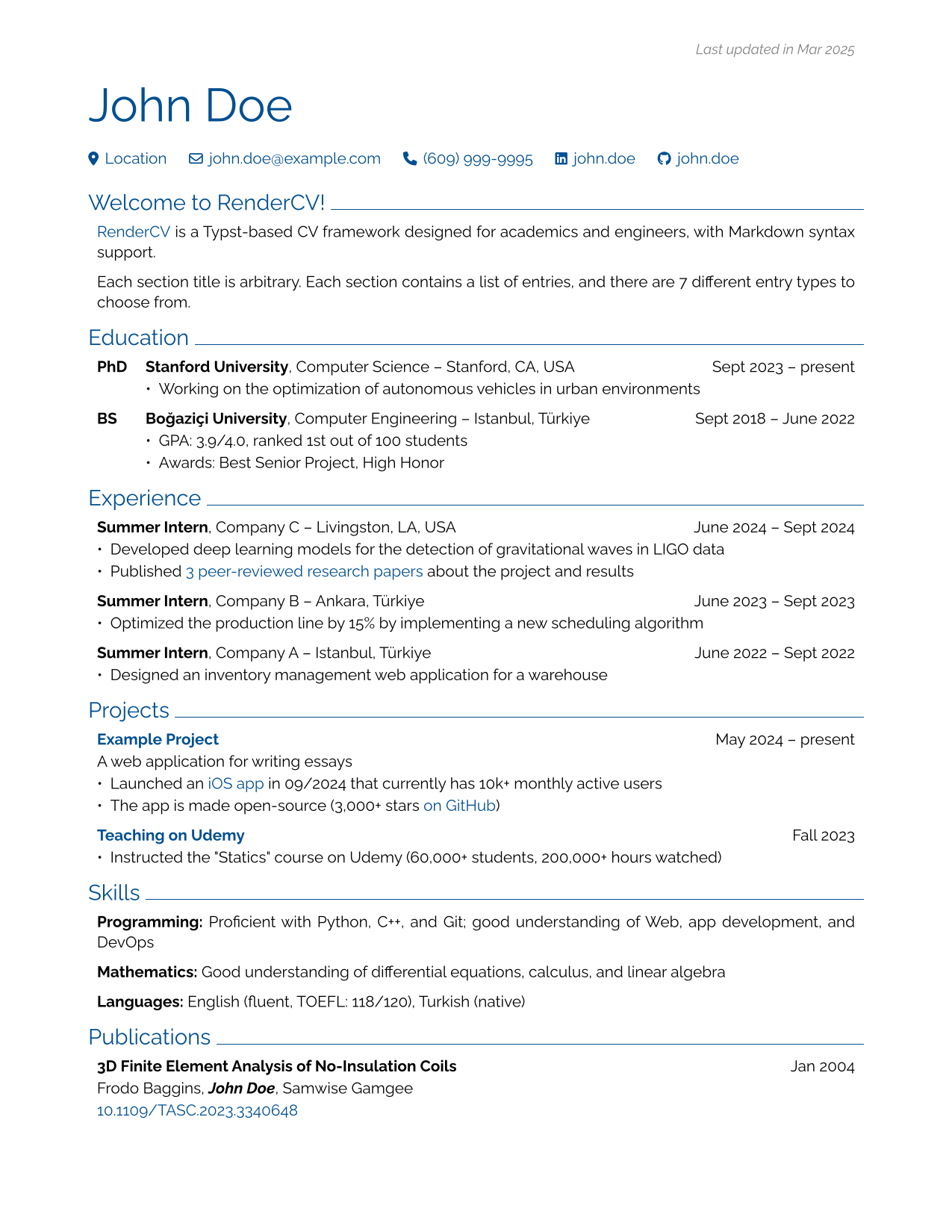 |
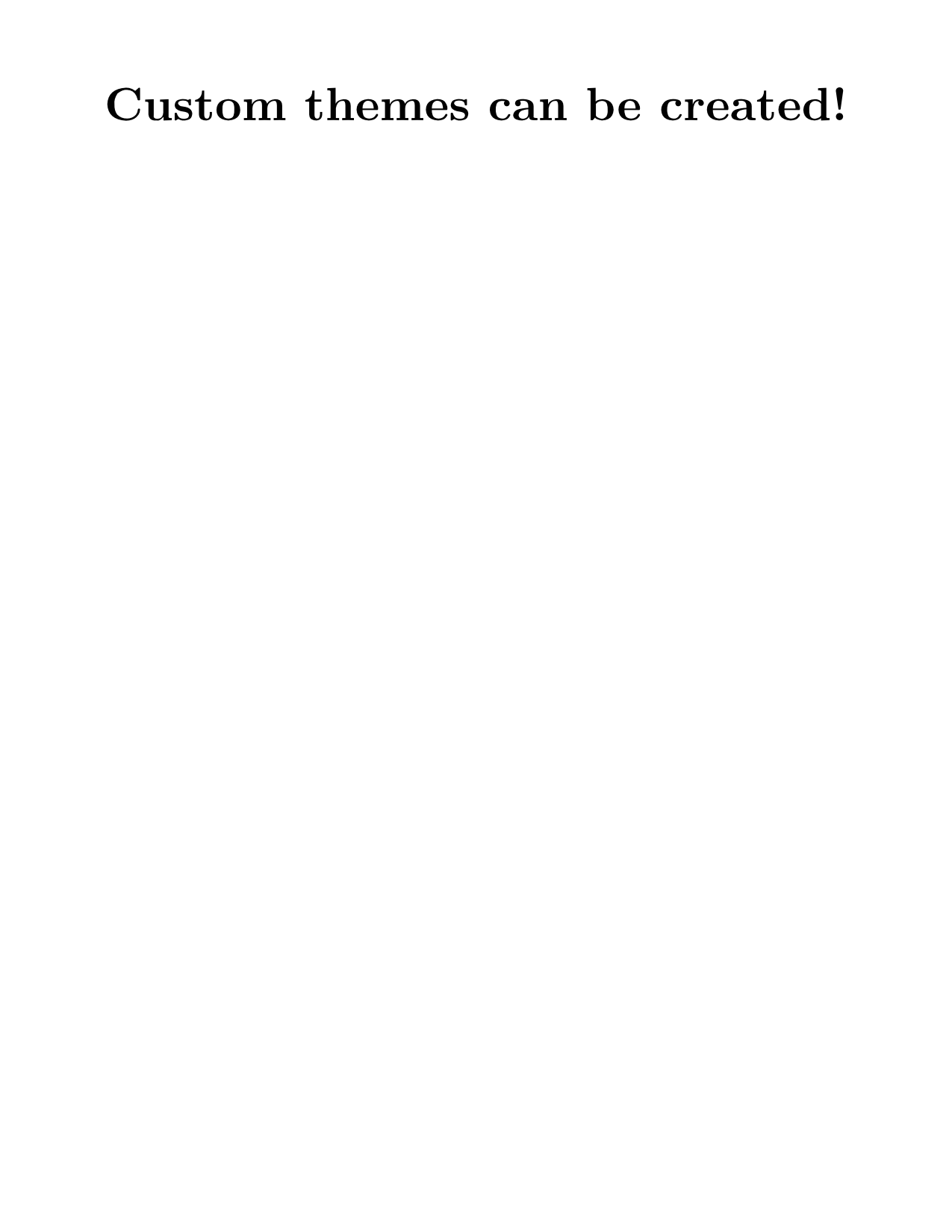 |
JSON Schema
RenderCV's JSON Schema lets you fill out the YAML interactively, with autocompletion and inline documentation.
Extensive Design Options
You have full control over every detail.
design:
theme: classic
page:
size: us-letter
top_margin: 0.7in
bottom_margin: 0.7in
left_margin: 0.7in
right_margin: 0.7in
show_footer: true
show_top_note: true
colors:
body: rgb(0, 0, 0)
name: rgb(0, 79, 144)
headline: rgb(0, 79, 144)
connections: rgb(0, 79, 144)
section_titles: rgb(0, 79, 144)
links: rgb(0, 79, 144)
footer: rgb(128, 128, 128)
top_note: rgb(128, 128, 128)
typography:
line_spacing: 0.6em
alignment: justified
date_and_location_column_alignment: right
font_family: Source Sans 3
# ...and much more
[!TIP] Want to set up a live preview environment like the one shown above? See how to set up VS Code for RenderCV.
Strict Validation
No surprises. If something's wrong, you'll know exactly what and where. If it's valid, you get a perfect PDF.
Any Language
Fill out the locale field for your language.
locale:
language: english
last_updated: Last updated in
month: month
months: months
year: year
years: years
present: present
month_abbreviations:
- Jan
- Feb
- Mar
...
Get Started
Install RenderCV (Requires Python 3.12+):
pip install "rendercv[full]"
Create a new CV yaml file:
rendercv new "John Doe"
Edit the YAML, then render:
rendercv render "John_Doe_CV.yaml"
For more details, see the user guide.
Project details
Release history Release notifications | RSS feed
Download files
Download the file for your platform. If you're not sure which to choose, learn more about installing packages.
Source Distribution
Built Distribution
Filter files by name, interpreter, ABI, and platform.
If you're not sure about the file name format, learn more about wheel file names.
Copy a direct link to the current filters
File details
Details for the file rendercv-2.6.tar.gz.
File metadata
- Download URL: rendercv-2.6.tar.gz
- Upload date:
- Size: 77.4 kB
- Tags: Source
- Uploaded using Trusted Publishing? Yes
- Uploaded via: twine/6.1.0 CPython/3.13.7
File hashes
| Algorithm | Hash digest | |
|---|---|---|
| SHA256 |
77e800de17933f451b0c31dc6ade8c61667a7ad7c8e05b8ef8a59321794a1f98
|
|
| MD5 |
12f44661898b12109dcb952c808e56c7
|
|
| BLAKE2b-256 |
93199a76c4060fcbc994022bc27186bab5b729bf123a433b76f78e530e56444c
|
Provenance
The following attestation bundles were made for rendercv-2.6.tar.gz:
Publisher:
release.yaml on rendercv/rendercv
-
Statement:
-
Statement type:
https://in-toto.io/Statement/v1 -
Predicate type:
https://docs.pypi.org/attestations/publish/v1 -
Subject name:
rendercv-2.6.tar.gz -
Subject digest:
77e800de17933f451b0c31dc6ade8c61667a7ad7c8e05b8ef8a59321794a1f98 - Sigstore transparency entry: 777820926
- Sigstore integration time:
-
Permalink:
rendercv/rendercv@8cac0e9984f426a83ba4ad2a5bcdf48012f08e3e -
Branch / Tag:
refs/tags/v2.6 - Owner: https://github.com/rendercv
-
Access:
public
-
Token Issuer:
https://token.actions.githubusercontent.com -
Runner Environment:
github-hosted -
Publication workflow:
release.yaml@8cac0e9984f426a83ba4ad2a5bcdf48012f08e3e -
Trigger Event:
release
-
Statement type:
File details
Details for the file rendercv-2.6-py3-none-any.whl.
File metadata
- Download URL: rendercv-2.6-py3-none-any.whl
- Upload date:
- Size: 121.3 kB
- Tags: Python 3
- Uploaded using Trusted Publishing? Yes
- Uploaded via: twine/6.1.0 CPython/3.13.7
File hashes
| Algorithm | Hash digest | |
|---|---|---|
| SHA256 |
3280d9bee4b052efb30decafe2a1058e4757ac1faaa36e66127f39202865ee69
|
|
| MD5 |
c085a57874e1723129ce2c2c4d885f22
|
|
| BLAKE2b-256 |
721b7e8967545cb845549988ca03636a504f18bf767159248dbeb0079090f6a9
|
Provenance
The following attestation bundles were made for rendercv-2.6-py3-none-any.whl:
Publisher:
release.yaml on rendercv/rendercv
-
Statement:
-
Statement type:
https://in-toto.io/Statement/v1 -
Predicate type:
https://docs.pypi.org/attestations/publish/v1 -
Subject name:
rendercv-2.6-py3-none-any.whl -
Subject digest:
3280d9bee4b052efb30decafe2a1058e4757ac1faaa36e66127f39202865ee69 - Sigstore transparency entry: 777820927
- Sigstore integration time:
-
Permalink:
rendercv/rendercv@8cac0e9984f426a83ba4ad2a5bcdf48012f08e3e -
Branch / Tag:
refs/tags/v2.6 - Owner: https://github.com/rendercv
-
Access:
public
-
Token Issuer:
https://token.actions.githubusercontent.com -
Runner Environment:
github-hosted -
Publication workflow:
release.yaml@8cac0e9984f426a83ba4ad2a5bcdf48012f08e3e -
Trigger Event:
release
-
Statement type:







